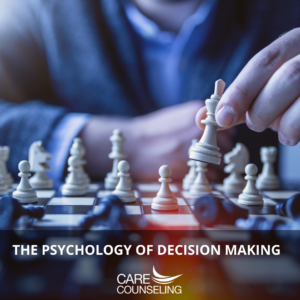The Psychology of Decision-Making
 Every day, we are faced with a myriad of decisions, ranging from trivial choices like what to wear to significant life-altering ones such as career changes or relationships. Behind each decision lies a complex interplay of cognitive, emotional, and social factors that influence our choices.
Every day, we are faced with a myriad of decisions, ranging from trivial choices like what to wear to significant life-altering ones such as career changes or relationships. Behind each decision lies a complex interplay of cognitive, emotional, and social factors that influence our choices.
The Decision-Making Process
Decision-making is a multifaceted process that can be broken down into several stages:
- Identification of the Decision:
The first step is recognizing that a decision needs to be made. This could be prompted by a problem, a desire for change, or external circumstances.
- Information Gathering:
Once a decision is identified, we gather information relevant to the choice. This may involve research, seeking advice, or drawing from personal experiences.
- Evaluation of Options:
We assess the available options and weigh their pros and cons. This stage often involves considering potential outcomes and consequences.
- Making a Choice:
After careful consideration, we make a decision. This choice is influenced by a combination of rational thinking and emotional factors.
- Taking Action:
The chosen option is put into action, and we follow through with the decision.
- Post-Decision Evaluation:
Following the decision’s implementation, we reflect on its outcomes and adjust our future choices based on the feedback and learning from the experience.
Factors Influencing Decision-Making
- Cognitive Biases:
Cognitive biases are mental shortcuts or errors in judgment that can affect decision-making. Common biases include confirmation bias (seeking information that confirms our existing beliefs), anchoring bias (relying too heavily on the first piece of information encountered), and availability bias (prioritizing readily available information).
- Emotional Influence:
Emotions play a significant role in decision-making. Positive emotions can lead to risk-taking behavior, while negative emotions can make us more risk-averse. Emotions can also cloud judgment and lead to impulsive decisions.
- Social Influence:
Social factors, such as peer pressure, societal norms, and the influence of authority figures, can sway our decisions. We often conform to the expectations of our social groups, sometimes at the expense of our personal preferences.
- Risk Tolerance:
Individuals have varying levels of risk tolerance. Some are more willing to take risks and embrace uncertainty, while others prefer safer, more predictable choices.
- Decision-Making Styles:
People exhibit different decision-making styles. Some are intuitive decision-makers, relying on gut feelings and instincts, while others are more analytical, using data and logic to make choices.
- Heuristics:
Heuristics are mental shortcuts or rules of thumb that simplify complex decision-making processes. While heuristics can be efficient, they can also lead to errors in judgment.
- Goals and Values:
Our goals, values, and personal beliefs strongly influence our decision-making. Choices that align with our core values are more likely to be satisfying and fulfilling.
The Role of Intuition
Intuition, often referred to as “gut feeling,” can be a powerful decision-making tool. It is the result of accumulated knowledge and experiences that our subconscious mind processes rapidly. Intuition can guide us in situations where we have limited information or when quick decisions are required.
Balancing Rationality and Emotion
Effective decision-making often involves striking a balance between rational analysis and emotional consideration. While logic helps evaluate options objectively, emotions provide valuable insights into our desires and preferences. Integrating both can lead to more satisfying and well-rounded choices.
The psychology of decision-making is a dynamic field that continues to evolve as researchers delve deeper into the intricacies of human choice. While decision-making is influenced by cognitive biases, emotions, social factors, and personal values, understanding these influences can lead to more informed and satisfying choices. Developing self-awareness about your decision-making style and biases is the first step toward making better decisions that align with your goals and values.



























